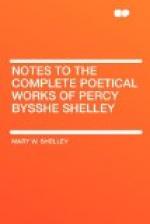‘I did not insert it,’ Leigh Hunt writes in his valuable and interesting preface to this poem, when he printed it in 1832, ’because I thought that the public at large had not become sufficiently discerning to do justice to the sincerity and kind-heartedness of the spirit that walked in this flaming robe of verse.’ Days of outrage have passed away, and with them the exasperation that would cause such an appeal to the many to be injurious. Without being aware of them, they at one time acted on his suggestions, and gained the day. But they rose when human life was respected by the Minister in power; such was not the case during the Administration which excited Shelley’s abhorrence.
The poem was written for the people, and is therefore in a more popular tone than usual: portions strike as abrupt and unpolished, but many stanzas are all his own. I heard him repeat, and admired, those beginning
‘My Father Time is old and gray,’
before I knew to what poem they were to belong. But the most touching passage is that which describes the blessed effects of liberty; it might make a patriot of any man whose heart was not wholly closed against his humbler fellow-creatures.
NOTE ON PETER BELL THE THIRD, BY MRS. SHELLEY.
In this new edition I have added “Peter Bell the Third”. A critique on Wordsworth’s “Peter Bell” reached us at Leghorn, which amused Shelley exceedingly, and suggested this poem.
I need scarcely observe that nothing personal to the author of “Peter Bell” is intended in this poem. No man ever admired Wordsworth’s poetry more; —he read it perpetually, and taught others to appreciate its beauties. This poem is, like all others written by Shelley, ideal. He conceived the idealism of a poet—a man of lofty and creative genius—quitting the glorious calling of discovering and announcing the beautiful and good, to support and propagate ignorant prejudices and pernicious errors; imparting to the unenlightened, not that ardour for truth and spirit of toleration which Shelley looked on as the sources of the moral improvement and happiness of mankind, but false and injurious opinions, that evil was good, and that ignorance and force were the best allies of purity and virtue. His idea was that a man gifted, even as transcendently as the author of “Peter Bell”, with the highest qualities of genius, must, if he fostered such errors, be infected with dulness. This poem was written as a warning—not as a narration of the reality. He was unacquainted personally with Wordsworth, or with Coleridge (to whom he alludes in the fifth part of the poem), and therefore, I repeat, his poem is purely ideal; —it contains something of criticism on the compositions of those great poets, but nothing injurious to the men themselves.
No poem contains more of Shelley’s peculiar views with regard to the errors into which many of the wisest have fallen, and the pernicious effects of certain opinions on society. Much of it is beautifully written: and, though, like the burlesque drama of “Swellfoot”, it must be looked on as a plaything, it has so much merit and poetry—so much of himself in it—that it cannot fail to interest greatly, and by right belongs to the world for whose instruction and benefit it was written.




